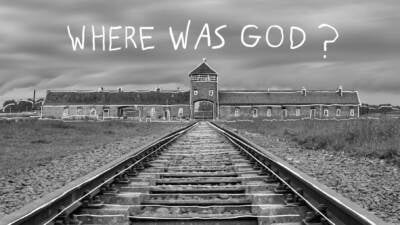Practically speaking, is there something unique about the Holocaust?
Jewish Identity and the Holocaust (Topic 7, part 2)
Share
In April 2020, to coincide with Yom HaShoah, the day in the Jewish calendar dedicated to Holocaust remembrance, and the 75th anniversary of the liberation, Rabbi Sacks launched a series of videos offering his perspective on some of the biggest questions asked about the Holocaust.
The Holocaust was not the only significant human tragedy in the 20th century. We’ve had a mass-murder of Armenians by Turkey between 1917 and 1923. More recently, we’ve had horrendous mass killings in Bosnia, in Rwanda, in Cambodia, in Darfur. The killing rate in Rwanda was greater than that in the Holocaust: 800,000 people murdered, mainly by machete, in a mere hundred days.
What made the Holocaust different was that it was a different kind of thing. It wasn’t a conflict. It wasn’t a political or military conflict. Jews were not a national entity. This was not a political issue. This was an extraordinary and unprecedented thing about purity of race, which hardly existed before. It existed in 15th century Spain, but by and large was a 19th and early 20th century construct. Jews were a religious minority, scattered about around virtually every country in the world, and nobody ever attempted, when there was nothing political or military at stake, to systematically eliminate a part of the population from wherever it could. Nothing of the kind. And there are two phenomena that show that it was unique.
Number one, the incredible lengths to which the Nazis went to hide what they were doing, to destroy all the evidence, to make sure there was nothing written down that could be held against them, et cetera. On the one hand, Himmler declared that this was a great chapter in German glory. On the other hand, they refused to let any evidence of it survive. Now, that didn’t happen in any of the other conflicts that I’ve mentioned.
And secondly, most significantly, because simply to put the Holocaust on the human map, two new concepts had to be created that never existed before. Number one, genocide. Number two, crimes against humanity. And why did they need to be invented? Because very simply, every single one of the accused in the Nuremberg trials made the following defence: “I was only obeying orders.”
Now, until then the defence “I was only obeying orders” was a valid defence. If you were obeying orders delivered by a properly constituted government of the country, then you were protected by the doctrine of national sovereignty. A government could decide what went on within its own borders. And all of a sudden, the Holocaust didn’t fit that any more, and so new legal concepts had to be born. And crimes against humanity is a qualification of, and, as it were, a refutation of the doctrine of national sovereignty.
So this attempt to hide, and this need to think in new ways, even to account for the Holocaust legally, these showed that nothing like it ever happened before, and I pray nothing like it will ever happen again.

This series, created in partnership with the Holocaust Educational Trust, has been made possible thanks to the generous support of Richard Harris.
More Holocaust Curriculum Resources

Faith After the Holocaust
Rabbi Sacks responds to the devastation of the Holocaust

Where can you find hope in the history of the Holocaust?
Hope and the Holocaust (Topic 10)

How does the Holocaust impact interfaith relations today?
Interfaith Relations and the Holocaust (Topic 9)

How do you connect the Holocaust with the establishment of the State of Israel?
Israel and the Holocaust (Topic 8)

Do you think it’s ever possible to forgive the perpetrators of the Holocaust?
Forgiveness and the Holocaust (Topic 6)

What is the difference between vengeance and justice?
Jewish Theology and the Holocaust (Topic 5, part 3)

What about a statute of limitations?
Just Punishment and the Holocaust (Topic 5, part 2)

A Just Punishment for the Nazis?
Just Punishment and the Holocaust (Topic 5, part 1)

Do you think the Holocaust represented a failure of humanity?
Humanity and the Holocaust (Topic 2, part 1)

Does God care about individual lives, or merely the survival of the Jewish people as a nation?
God and the Holocaust (Topic 1, part 3)

Do you have faith in humanity after the Holocaust?
God and the Holocaust (Topic 1, part 2)

Where was God during the Holocaust?
God and the Holocaust (Topic 1, part 1)

What is theologically unique about the Holocaust?
Jewish Identity and the Holocaust (Topic 7, part 3)

Should a Jewish theological response to the Holocaust include issues of justice?
Jewish Theology and the Holocaust (Topic 3, part 2)

Should the Holocaust be a key ingredient of our Jewish identity?
Jewish Identity and the Holocaust (Topic 7, part 1)

How has the Holocaust impacted your personal relationship with God?
Personal Faith and the Holocaust (Topic 4)

What do you think the Jewish theological response to the Holocaust should be?
Jewish Theology and the Holocaust (Topic 3, part 1)

How can I have faith that God is within each of us if I mistrust humanity?
Humanity and the Holocaust (Topic 2, part 3)

Can we trust people other than ourselves?
Humanity and the Holocaust (Topic 2, part 2)
